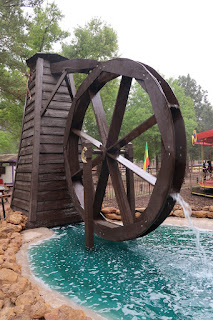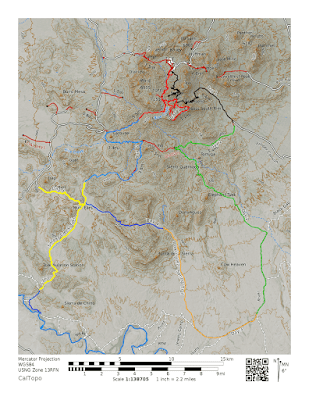Gear List: Emergency Repair Kit
What's in my Emergency Repair Kit
Today’s post I will be sharing a part of my gear list. While, I am not an extreme weight watcher
when packing my gear, I do try to keep my total weight low while being
functional. The same is true for my gear
repair kit. Fortunately, I have never
had to make a repair with my current kit, but I have used its similar components
throughout my outdoor and Army life.
 |
| My Gear Repair Kit |
Gear Repair Kit
Here are the contents of my repair kit and their weight in
grams. For those of you who like ounces,
it weighs approximately 2.5 oz. If you
noticed the weights are not precise, it is because my little scale is only
sensitive down to .01 kilograms or 10 grams, but this should be close enough
for such tiny gear.
|
Item
|
Grams
|
|
Duct Tape
|
10
|
|
Safety Pins
|
10
|
|
Needle
|
10
|
|
Super Glue
|
10
|
|
Tenacious Patches
|
10
|
|
Stuff Sack
|
20
|
|
Total Weight:
|
70
|
Duct Tape - duct
tape is a very versatile item and is part of my first aid kit and repair
kit. I cut 2-inch sections of straw and
wrapped 24 inches of tape around the straw or you can get it pre-rolled.
Duct tape can be used to hold together a blown out shoe (I have fixed
boots like this on Army hikes), a quick repair on tears or rips, or hold items
together. Plus, duct tape is waterproof,
so it can be used on waterproof items for temporary fixes.
Safety Pins –
safety pins are an essential part of a field sewing kit. The main use for safety pins is to hold
fabric together while you are sewing.
Other uses would be holding together broken zippers or hanging up wet
clothes on a line.
Needle and Thread
– I carry two needles wrapped in a small amount of duct tape, so I’m not
stabbed when I reach my hand in my repair kit.
In addition, I carry one small roll of thread; however, many people
carry only floss instead of thread and floss.
Needles and thread can be used to sew up any rips and tears or reattach
buttons. Moreover, needles can be used
to remove splinters or pop blisters.
Super Glue – I carry one single serving tube of super glue in my repair kit. Super glue is similar to duct tape and can be used to repair almost anything. It can be used to seal seams, hold together blown out shoes, or make minor repairs to broken gear.
Tenacious Patch Kit
– Tenacious Patches come with multiple precut circle patches. The patches can be applied to any material,
but I keep them in case I need to repair my sleeping bag or sleeping pad. I consider those two items high priority, and
the adhesive patches are the best method I have found to make an airtight patch
with no sticky residue.
Stuff Sack – The stuff
sack has no function in the repair kit other than It keeps my repair kit and
first kit together.
Supplemental Items
Knife - while my
knife is not specifically in a part of my repair kit, it is essential for
making repairs. If any item needs to be
cut, you need a knife or scissors to get the job done.
Rope - I always
carry a little extra nylon rope for tie downs and hanging my food to keep
animals away. However, it can also be
used in gear repair. Rope can be used as
a belt, shoelaces, or to hold items together.
Possible Future Additions
There are a few additions I would like to make to my kit,
but I always seem to forget about when I’m ordering off Amazon or in a store
that will have the items. Hopefully I
will remember to pick them up before I learn the hard way.
Zip Ties – zip
ties are plastic fasteners used to hold two items together. Possible uses include securing a pack to
your frame after a rip, make shift shoelaces, and holding a broken buckle
together.
Fabric Tape – fabric
tape is a quick way to make repairs to cloth items without sewing. Fabric tape permanently fuses with the material
it is applied too. Also, It is important
to get a non-iron version to make field repairs easy (it is not recommend to
hike with an iron). Fabric tape can be
used to repair rips and tears in non-waterproof items such as pants.
Silicone Glue -
silicone glue is a type of glue used to seal and waterproof seams. If there is a rip in your rain gear or waterproof
section of your tent, use a sew kit to repair the damage. Then you seal the new seam with silicone glue
to ensure that section is still water proof.
Final Thoughts
While, I can't tell you exactly what you need in you repair kit because everyone has different gear, I do highly recommend carrying at least some type of repair kit. It is true that the kit will be rarely used, but it will make a much better trip if you have at least some items available to make repairs.
What are you carrying in your gear repair kit? Also, if you like the blog, please follow us on Facebook.
Jarrett Morgan




Great information!
ReplyDeleteThanks, I'm glad you enjoyed it. What would you carry in your ideal repair kit?
DeleteI'm putting one together on Tuesday
DeleteIn a coleman splash proof bag:
ReplyDelete3 yards orange duct tape
2 yards silver duct tape
1 tube Krazy glue in a rigid container
5 pack small razor blades
4 8" mounting zip ties
2 3" lengths hippo brand patch
7 various sized safety pins
Sounds like a good kit to me. I'm sure things will slowly get added as things break in the field.
Delete